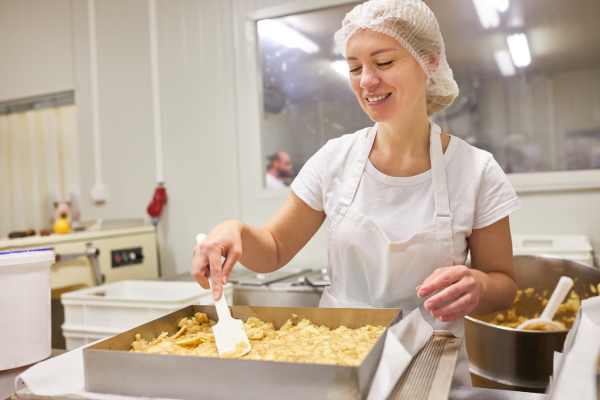
PFA Coating in the Food Industry: Safety and Efficiency
Innovations in the materials used across the food processing and commercial baking sectors are pivotal in ensuring safety, efficiency, and quality.
Among the most notable advancements, Polytetrafluoroethylene (PFA) has become synonymous with reliability and excellence. Often confused with PTFE (sometimes better known under the DuPont brand name Teflon coating), PFA is commonly used as a favored non-stick pan coating. However, there are myriad more practical applications and benefits for enhanced safety and efficiency in the food industry.
Let’s start with the basics and then dig into the details.
What is PFA?
PFA (Polytetrafluoroethylene) is a high-performance polymer with remarkable properties and an ideal choice for commercial food-based business.
During the baking process, PFA coatings melt and flow to form a non-porous film with increased permeation resistance, making it a particularly effective non-stick pan coating for commercial baking. However, the other unique properties of PFA make it equally suitable for various other food processing and food packaging operations.
The Unique Properties and Features of PFA
A smooth and frictionless surface is a given for any non-stick pan coating to prevent the adhesion of food particles and residues. But what are the other defining features of PFA that make it well-suited for the demands of the food industry? Here’s a comprehensive overview:
- Excellent chemical resistance – PFA demonstrates outstanding resistance to a wide range of chemicals, acids, and corrosive substances, making it ideal for food processing and commercial baking operations where equipment is exposed to various ingredients and cleaning agents.
- Electrical current resistance – Like traditional Teflon coating, the insulating properties of PFA mean it is more resistant to electrical current, making it popular in applications involving electrical components and connections.
- Enhanced thickness parameters – Unlike regular Teflon coating, PFA can be applied in thicknesses ranging from 200 to 1000 micrometers, allowing for customization based on the specific requirements of different applications.
- High corrosion protection – PFA coatings provide high-level corrosion protection to underlying surfaces, shielding them from the adverse effects of moisture, acids, and other destructive agents.
- Oleophobic and Hydrophobic – PFA repels soils and fats (oleophobic), preventing adhesion to coated surfaces. It’s also resistant to water absorption (hydrophobic), which reduces the risk of bacterial growth.
- Excellent Temperature Resistance – PFA maintains integrity and functionality across a broad temperature range of 260˚C/500˚F, even when equipment is in continuous use.
- UV resistance – Resistance to ultraviolet (UV) radiation means PFA remains stable in applications involving outdoor or light-exposed environments.
The Benefits of Using PFA
As you can probably already see, the properties of PFA are particularly applicable to the challenging environments within food processing and commercial baking, where optimal performance, durability, and protection are a necessity.
A smoother surface finish and high tensile strength make it advantageous to alternative polymers like PTFE and FEP (like Chemours Teflon®) for food industry businesses. Other benefits of use include:
- Improved cleanliness and hygiene.
- Reduced need for constant cleaning and maintenance.
- Extended lifespan of equipment.
- Enhanced operational efficiency – potentially leading to significant cost savings.
Practical Applications of PFA
PFA can be utilized in a variety of ways to enhance processes and procedures across food production, commercial baking, and packaging:
- Food processing systems – Because it’s equally effective in repelling rubber and glue adhesive as food and grease particles, PFA can also be applied to chemical vessels, pipework systems, agitators, ductwork, etc. for smoother operation.
- Commercial baking equipment – Non-stick pan coating can be applied to mixing bowls, beaters, dough hoppers, and various other industrial bakeware products and utensils.
- Conveyor belts and rollers – Adding a smooth and frictionless surface coating prevents food items from sticking during transit, ensuring the optimal integrity of the products.
- Molds and dies – The improved release properties of PFA ensure that molded products detach effortlessly, resulting in a more efficient production process and less wastage.
- Packaging machinery: PFA’s non–stick properties prevent product sticking and contamination, ensuring packaged food maintains its quality and appeal.
- Food contact surfaces – PFA coatings provide an excellent barrier, ensuring the safety and integrity of final packaged products.
How PFA Coating Works
At Crest Coating, we specialize in using PFA Coatings to apply the ultimate fluorocarbon layer of protection. Our expertise in PFA powder coating guarantees a uniform application – even on complex shapes. Examples of products we regularly work with include:
- Food grade equipment
- Chemical tanks
- Molds
- Dough rollers
- Pumps
- Valves
- Impellers
- Robotic equipment
- Semi-conductors
Our focus is on high-quality output and customer service excellence, no matter how complex your requirements are. Check out our in-house capabilities to learn more about our PFA coating and quality assurance processes.
Need more information? Contact our team to discuss your business needs, or fill out a quick online form to request your hassle-free, no-obligation quote.